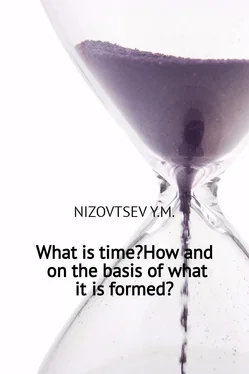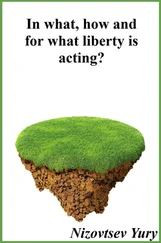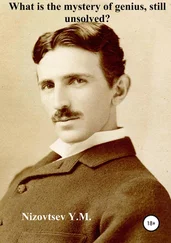Own time, or "now" of the person, and actually process of receiving and processing information by consciousness, explains cryptic till this day the fact of the manifestation in the child of consciousness and saving consciousness by the person during life.
We know from practice that consciousness is not manifested at the children in the case of absence of live conversation with him in the childhood of other people. Really, communication from the perspective of filing at first to the child of voice and iconic information, which is clear for him so as it is connected to meal, walks, entertainments, etc., gradually creates at him ability of understanding environmental and ability to operate according to this understanding. To do this he initially did not even need to talk. The main thing is the fact that he on examples from adults learns to select from surrounding only those data which he can decrypt and interpret. If the similar information channel is absent, the child can't "reach" human "now" and he remains in time of the living being which doesn't have self-consciousness, for which the actions based generally on reflexes and instincts are characteristic.
It is known that the person, the long time remaining in perfect loneliness without information influx enough quickly runs wild or, as speak, "goes crazy". There is it besides because "now" of the person is formed by copies of the same external. There is only information from within as the form of some memories as well as instinctive and reflex responses for his consciousness. As a result, "now" is slowed down that is manifested in the actual stop of time for him, and the person turns into the being possessing only by primary instincts and reflexes.
Now consciousness in representation of science is considered secondary, a consequence of natural processes. As you can see, everything occurs on the contrary: the unidirectional change of beingness as conjoint complex of the material objects, space and time happens in case of constant involvement of consciousness. Absence of consciousness in beingness means the actual absence of beingness so as even if to assume existence of such beingness, who will be able grasp this beingness, so no matter is it or not, this will still remain unknown to anyone, because that someone doesn't exist. And, on the contrary: without support on beingness consciousness is lost as there are not apps for it, or there is nothing to do to it. Such consciousness, which is nothing to do, can't be. About what development of consciousness it is possible to speak here?
The material beingness in the infinite variety is always together with the material echelon – by consciousness, without which this variety couldn't be manifested. The term "always" means that outside duration the consciousness isn't present, hence, there is no beingness also. Therefore a condition of their coexistence is time. In its finite duration the consciousness only and is capable to interact with remaining beingness, to open it as consciousness can until, and reveal itself into it in the changes.
Thus, not "the thing in itself (the transcendental object)” is outside any thinking" as Kant [3] claimed, but both material objects – a thing and consciousness – only and coexist really in the interaction so as not consciousness in itself only influences on itself and surrounding it, but and the thing always influences on consciousness. This mutual influence means that the friend without friend they are lost. Therefore Fichte's thought: "I do myself: own beingness by means of the thinking … I – it is unconditional, is own creation" [4], is correct only half. Without support of consciousness on remaining beingness consciousness can create nothing, including itself. Though, certainly, it is difficult to deny the leading role of consciousness in the process of interaction.
For the person who has consciousness, itself consciousness remains as "the thing in itself (the transcendental object)” at any level of development of the person. It is implicit the person himself recognized this fact long ago, having declared that consciousness is incorporeal, ideal. Really, consciousness can't be touched, but after all and a magnetic field we can't feel.
Actually there is nothing more real than consciousness thanks to which, actually, all and occurs, more precisely, everything is manifested.
Consciousness as the highest material component of beingness responds for maintenance of an animateness of beingness and manifests it variously, taking care of itself and it. However similar high-organized form of a matter has no basis in our three dimensional measurement, and only goes it through the appropriate carriers, restricting itself in this finite who, naturally, can only rejoice and be surprised to this arrival but who will not be able to penetrate into structure of matter of the "highest" measurement. Therefore we can only build guesses about consciousness and our own mission, as temporal owners of consciousness. You can read about it in the final chapter and in the source [1].
So, consciousness and beingness can't exist the friend without friend, they are uniform however each of them, is also uniform in a basis unknown to us, but enters interaction in a divided state.
Each consciousness is surrounded by other consciousnesses, all of them in turn, are shrouded by material objects of another kind which offer themselves to individual consciousnesses so as those are capable to accept them into own existence. And consciousnesses themselves can operate in measurements, which are others for him, only via the material carriers of these measurements. Similar process of determination of itself in the finite allows personal consciousness, at least, to live in the lowest forms, but still feeling itself.
The highest form of consciousness, i.e. a self-aware form, is already capable not simply to feel itself, but – to separate itself from all other and therefore purposefully to influence this separated.
What is, actually, most of all necessary for consciousness from the world in the finite, and what it can do here?
Consciousness is capable on a lot of things: both to think, and to act, both to love and hate, and to fear, and to rejoice. Consciousness can learn world around and itself, and does it, developing itself in this process.
But accumulation of knowledge in itself can go infinitely that makes senseless it. One aspiration for knowledge supersedes all other aspirations, which are no less, and perhaps more important for the development of consciousness. People perfectly understand that from multi knowledge they don't become better, it often burdens them, and individual consciousness wondering just to what it is inclined, to what entails it.
Ordinary life with its cares, burdens, chagrin, disturbances, grieves and rare moments of pleasure, delight, of course, is good in itself, allowing each personal consciousness be in the thick of things, and not only as a supernumerary. Here some throb of the General is felt with which the separate consciousness merges. For this reason each person doesn't wish to be separated from this General, and so clings to life.
But knowledge and life – whether this most important out of that to what consciousness aims?
It is possible to try to learn this main thing if to understand that, first of all, makes each personal consciousness. And any individual consciousness in own finite, first of all, creates itself, forming own time, or "now". What the individual consciousness will make here, this and become own thing. Whether it is bad, well, but it is impossible to take away. This self-making is provided to consciousness by material objects surrounding it, from which it is capable through the feelings of the carrier to select information, to process it, paying attention therein on something more or less in this "now". That is without comprehension and sensual processing by consciousness of the arriving information with transformation of a final information product into acts life for human consciousness turns into vegetable existence.
Читать дальше
Конец ознакомительного отрывка
Купить книгу












